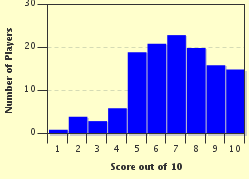Quiz Answer Key and Fun Facts
1. In 2008, Barack Obama became a 'new sensation' when he was elected to the position of President of the United States of America. Which of the following firsts was NOT achieved by Obama?
2. The founding of the United Nations in 1945 was an important step towards maintaining peace and international cooperation following the horrors of the Second World War. The first Secretary-General of the UN was appointed in 1946 - who was this 'new sensation'?
3. In 1924, British politics was rocked by the arrival of a 'new sensation' when the Labour Party - a socialist party designed to represent the needs of the working classes - formed a government for the first time. Who was the Labour Party leader who held the post of British Prime Minister from January to November 1924?
4. A 'new sensation' in South African politics occurred in 1994 when elections marking the end of apartheid were held and the author of 'A Long Walk to Freedom' was installed as the first President of the Republic of South Africa. What was the name of the man often described as the "Father of the Nation"?
5. The world's first female prime minister took office in Ceylon (now known as Sri Lanka) in 1960. What was the name of this 'new sensation'?
6. Vladimir Ilyich Ulyanov became a 'new sensation' in Russia when his Bolshevik party overthrew the provisional government during the October Revolution of 1917. This event led to Ulyanov becoming the first Communist head of government in the world, but by what name was he better known?
7. Elections to the Scottish Parliament in 2007 resulted in a 'new sensation' - for the first time, the First Minister of Scotland was a member of the Scottish National Party. Can you name this person who went on to hold a referendum on Scottish Independence in 2014?
8. Argentina was the first country in the world to have a female president. This 'new sensation' occurred in 1974, but what was the name of the woman involved?
9. Over 70 countries worldwide have a 'green' party advocating (some more closely than others) various principles such as ecological wisdom, social justice and non-violence. In 2004, Latvia became the first country in the world to have a 'green' head of government. Who was this 'new sensation'?
10. A 'new sensation' back in 1861 was the man who became President of the Confederate States of America and led the secessionist southern states into the American Civil War. What was the name of this politician and soldier?
Source: Author
Fifiona81
This quiz was reviewed by FunTrivia editor
trident before going online.
Any errors found in FunTrivia content are routinely corrected through our feedback system.

